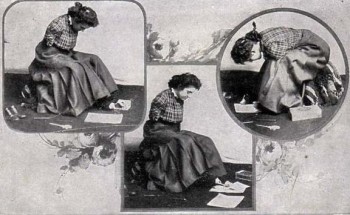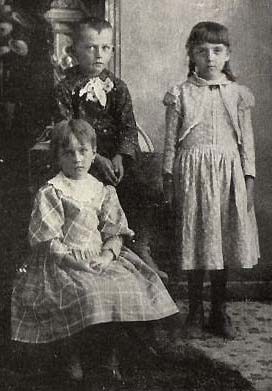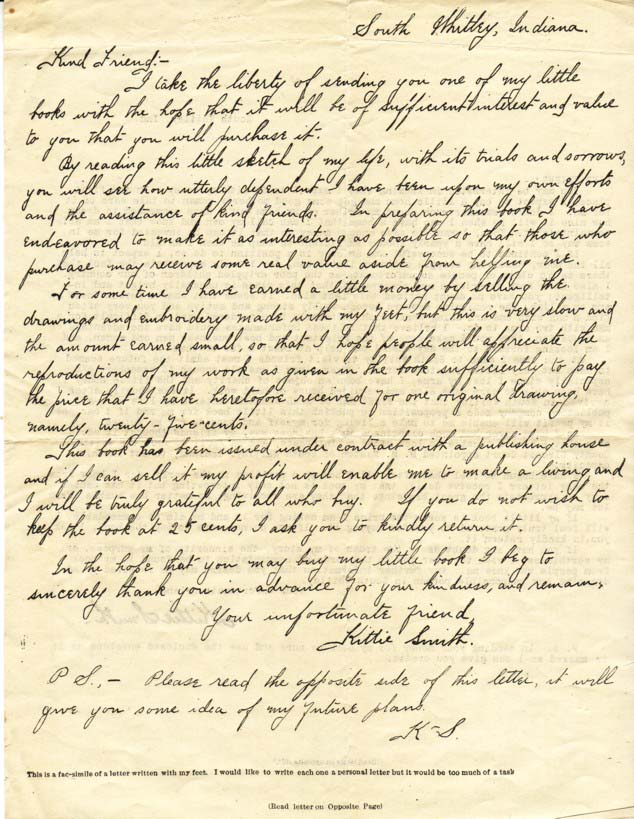Today I Found Out |
| The First Woman to Cast a Vote in Chicago Did So With Her Feet Posted: 04 Oct 2011 07:00 PM PDT  Kittie Smith: "How I sharpen my lead pencil. How I use shears in cutting paper and cloth. The Position I occupy when I write." Today I found out the first woman to cast a vote in Chicago did so with her feet. The woman was Kittie Smith. Smith lost her arms as a child, after having both her arms and hands burned badly on a kitchen stove. It is unclear exactly how her arms came to be burned so badly so that they needed amputated. It is thought by many that her father did it intentionally, given his history of alcoholism and abuse of his children, as well as the manner and severity in which she was burned. However, later in life, Kittie denied this and said it was an accident. In Kittie's own words: My father was a drinking man and was in the habit of sending his children to a neighboring saloon for liquor, though I was sent more often than any of the others. I remember tasting of the liquor I carried, and think it was always beer. In November, 1891, and on the afternoon of Thanksgiving Day, my father and I were alone in the house, my brothers being at play out of doors, and in going about the house, I found a bottle filled with what I afterwards knew must have been whiskey. Being but a child, I picked up the bottle and drank freely from it; its effect was almost immediate, and I grew weak and stupefied. My father was in an adjoining room and called to me to go and put some wood on the kitchen fire and I called back that I was sick and could not go, but he insisted and I obeyed. I had taken the lids from the stove, when, from the combined effect of the heat and the liquor, my whole being gave way and I sank on to the open stove, unconscious. I must have lain there some time, for the physicians and surgeons said that the bones of my hands and arms were amputated three inches from the shoulders. I was burned on the neck and on the chest but those burns were not serious. We lived at this time at 548 Park Avenue, and neighbors claimed that my father was also intoxicated, and that he held me on the stove until my arms were burned, and that they heard me screaming. The Humane Society of Illinois took the matter and had my father placed under arrest. After a trial in a Justice Court, he was held to the grand jury, and, on the final trial in the spring of 1892, he was acquitted for lack of evidence.  Kittie Smith: "My picture is the one standing at the right. It is not very good of me for I moved. But it is the only picture I have showing my arms, so I value it very highly." Her father shortly after waived all rights to her and her care was given to the Children's Home Society of Illinois (her mother already having died when Kittie was 9 years old). During the next several years, she was taken in to a variety of homes, often for only a few weeks at a time, and was supported by donations through the "Kittie Smith fund". She learned to write, sew, and do other tasks at the Home for Destitute and Crippled Children. Upon reaching adulthood, Kittie was on her own as far as supporting herself and earned money by selling drawings, embroidery, and writing cards, all made with her feet. Kittie eventually became the first woman to vote in Chicago Illinois in 1913. "Hold on there!" You say? "The 19th Amendment wasn't passed until 1920. How was she able to vote in 1913?" She was able to vote largely by the tenacious and persistent efforts of Gracie Wilbur Trout and her cohorts, in 1912 through 1913. By their efforts, in Illinois, on June 26, 1913, women began being allowed to vote on presidential elections as well as many other elections, with the bill being signed by the Governor of Illinois in front of Trout. In 1913, an estimated 250,000 women, with Kittie Smith leading the way, voted in Chicago Illinois when the first Illinois election took place after that bill passed. For those who are curious, here is an example of her penmanship: Bonus Factoids:
Sources: |
| You are subscribed to email updates from Today I Found Out To stop receiving these emails, you may unsubscribe now. | Email delivery powered by Google |
| Google Inc., 20 West Kinzie, Chicago IL USA 60610 | |
--
Thanks for being part of "PoliticalForum" at Google Groups.
For options & help see http://groups.google.com/group/PoliticalForum
* Visit our other community at http://www.PoliticalForum.com/
* It's active and moderated. Register and vote in our polls.
* Read the latest breaking news, and more.


No comments:
Post a Comment